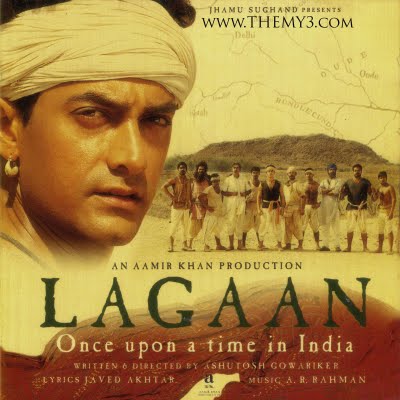
LAGAAN
India, 1999, 215 minutes, Colour
Aamir Khan, Gracie Singh, Rachel Shelley, Paul Blackthorne.
Directed by Ashutosch Gowariker.
Lagaan was nominated for an Oscar for the best foreign language film. It is a touch of the sweeping epic with all the ingredients of the popular Bollywood and Indian films.
The film was set in 1893 and shows the difficulties of tribes in central India, especially with drought and the lack of crops and the demands made by the rajahs as well as the British for taxes, even double taxes. The title of the film, Lagaan, refers to these taxes.
The film shows life in the village and has a number of songs in the Indian style, all rather spectacularly performed. The film also focuses on the British Raj and its arrogance. The focus is also on cricket. The British soldiers play cricket and preserve the traditions of home in this sport and all that attends it. In a moment of pique, the British commander, Captain Russell, challenges the Indians to beat them in the game of cricket. He promises no taxes for three years if they win, double taxes if they lose.
His sister, visiting from England, and aghast at the arrogance of her brother, helps the Indians to learn about the game and to practise. The film has many collages of the practice and the Indians' discovery of a game - which will, of course, be their national game and in which they will beat England during the coming century.
The final hour of the film is the match itself, staged very interestingly, with the English batting first and doing particularly well until the Indians work out that they can trick the English with spin bowling and get them out of their crease. The rest of the film is the desperate innings by the Indian team and all the drama, with melodramatic touches, before their captain hits the final six.
The film recreates India of the period, highlights the injustices of the Raj as well as the domination of the rajahs. It shows the lives of ordinary people. It also reminds audiences of the heritage that came before independence in 1948.
1. The popularity of the film, Oscar nomination? Popularity in India, in the UK, beyond?
2. The recreation of the period, the Indian countryside, the drought? Village and life in the village? The British Raj? Their lifestyle? The majesty of the buildings? The cricket matches and their staging? The songs and dances and the choreography? The musical score? The length of the film and the typical Indian ingredients for an Indian audience?
3. The title, the focus on taxes, the explanation of the rajahs and their taxes, the British, the possibility of double taxes? The consequences for the people, their hunger, their work, drought? The significance of the cricket match for the remission of the taxes?
4. 1893, the political state of India? The British rule, the expatriates in India? Their arrogance, manner? The treatment of the Indians, attitudes towards them, as less than the British, having no hesitation in humiliating and striking them? The critique of the Raj? Not everybody as objectionable as Captain Russell? The other members of the cricket team? The military authorities, the older military authorities with more impartiality? The umpires? Miss Russell and the new generation and their more kindly attitudes towards the Indians?
5. Life in the village, hardships, work? Bhuvan and his wanting to save the gazelles from the hunters? His being humiliated by Captain Russell and the English? Watching the cricket, the defiance, the challenge from Captain Russell about the cricket match? Bhuvan's hesitation, his acceptance?
6. The people in the village, the older generation, the doctor, the farmer? The young people? The way of life? The taxes? The religious observance?
7. The rajah, his status, his appealing against the taxes, Captain Russell wanting him to eat meat while he was a vegetarian, his refusal? His plea for the people, his request about the pilgrimage? His watching the match?
8. Bhuvan and his friends, the selection of the team, finding the different abilities? The significance of the Untouchable man, his being a cripple, the others walking out, the impassioned speech by Bhuvan about equality and giving religious motives as well as social justice? Their acceptance of the Untouchable?
9. The collage of the practice, developing their skills? Bhuvan and his leadership of the team? Miss Russell and her presence, the promise to help, her coming to the practices? Her brother seeing her?
10. The songs and dances, the situation, the clouds coming and the prayer and song for rain? The determination to win the match? The social sense in the village? The song of prayer that they win the cricket match?
11. The staging of the match, the English winning the toss, the English innings, the range of bowling, the disappointments on the first day, the lack of spin? The next day and the change of fortune, getting the English out of their crease? The Indian innings, their dependence on Bhuvan, the various batsmen and their skills, determination, the sledging by the British, the angers? The lack of concentration and their getting out? The crippled man and his exhaustion? The umpires allowing a runner for the next batsman? The Untouchable and his surviving to the end, enabling Bhuvan to get the final runs - the irony of Captain Russell and his joy in catching Bhuvan out - but over the boundary?
12. The consequences of the cricket match for the people at the time? The enjoyment of the spectators and the great participation? Cricket becoming the national sport?
13. A lavish entertainment, a reminder of the past, Indian society, changes from the 18th century into the 21st century?